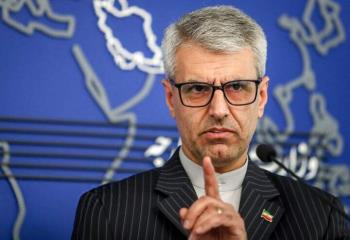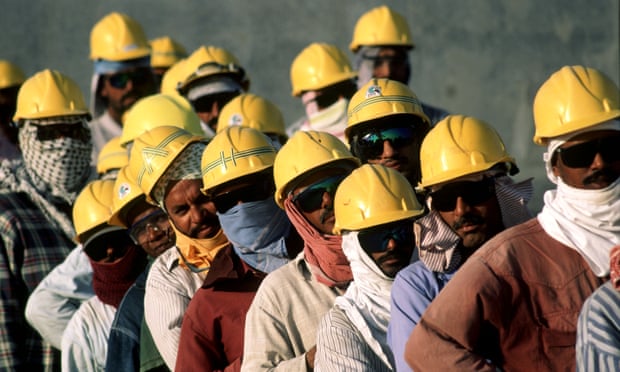Qatar is failing to investigate the sudden deaths of hundreds of migrant works, the Guardian can reveal.
Hundreds of labourers in the World Cup host nation die each year, with the majority of the fatalities attributed to heart attacks or “natural causes” by the Qatari authorities. Many are young men who die in their sleep – a phenomenon locally dubbed “sudden death syndrome."
Last week the Guardian reported that hundreds of thousands of workers were being exposed to potentially fatal levels of heat stress, toiling in temperatures of up to 45C for up to 10 hours a day. High temperatures put a huge strain on the cardiovascular system and cardiologists say there is a direct link between heat stress and the high numbers of young workers dying in the summer months.
In most cases no autopsies are performed on the bodies of migrant workers, whose deaths have been attributed to cardiovascular or “natural” causes.
In 2014, a report from the Qatari regime’s own lawyers, international law firm DLA Piper, “strongly” recommended that it commissioned research into the deaths of migrant workers from cardiac arrest. Yet so far it has failed to take action.
At least 1,025 Nepalis died in Qatar between 2012 and 2017, 676 of them from causes deemed to be natural. The causes included cardiac arrest, heart attack, respiratory failure and “sickness”, according to a number of official sources, including the Foreign Employment Board, a government agency in Nepal responsible for the welfare of migrant workers. The FEB’s data is largely derived from death certificates issued in Qatar.
Data from the Indian government reveals that 1,678 Indians died in Qatar between 2012 and August 2018. Of these deaths, 1,345 were classified as “natural” – a rate of four each week.
Qatari law prohibits postmortem examinations except in cases where a crime may have been committed or the deceased may have suffered from an illness prior to death.
However, the 2014 DLA Piper report recommended that the law “be extended to allow for autopsies or postmortem examinations in all cases of unexpected or sudden deaths".
A forensic expert in Qatar told the Guardian that in the majority of these cases, only an external examination is performed to determine the cause of death.
Qatar’s reluctance to perform autopsies has left families across south Asia confused and suspicious about how their loved ones died.
Rupchandra Rumba was working as a scaffolder at the Education City World Cup stadium when he died in his labour camp in June this year. He was 24. Rumba’s death certificate identified the cause of death as “acute cardio respiratory failure due to natural cause".
Shortly after his death, Rumba’s wife, Nirmala Pakrin, received a call from his boss. “He said: ‘We tried our best to treat him but he didn’t survive. We took him to the hospital for autopsy'".
But no autopsy was carried out, said Pakrin. “There were some blood stains around his mouth and nose, but the rest of his body was untouched".
A Qatar government official said that according to the law, families of the deceased must approve an autopsy before it is carried out.
"In most cases related to guest workers, families refuse an autopsy due to a desire to have the body returned as quickly as possible for the completion of religious burial or cremation rites. This creates a difficulty in respect of investigating the cause of death in some cases,” the official said.
However, the Guardian spoke to the families of three Nepali workers who died in Qatar in the past 18 months, including Pakrin. None had been asked whether they wanted an autopsy.
Kausik Ray, a professor of public health at Imperial College London, said: “People aged 20 to 50 in general don’t die in their sleep suddenly … You could not say they died from heart failure or respiratory failure without a postmortem, unless you had information about their prior [medical] history".
Ganesh Gurung, a member of the Policy Research Academy, a government thinktank in Nepal, said death certificates are largely a formality, issued to satisfy the requirements of the airlines that transport the bodies home.
“Because it’s just a formality, the doctors tend to issue certificates based on hearsay. In most cases, they do not even bother to examine the dead bodies, let alone conduct a postmortem. Postmortems are extremely rare, because they require time and money. Why would they bother to spend time and money on the dead?"
Gurung said mandatory postmortems should be incorporated into all bilateral labour agreements between Nepal and the countries where its migrant labourers work.
Nick McGeehan, a director of Fair/Square Projects, an organisation that conducts research on Gulf migrant workers, said the findings expose a lack of concern for workers’ welfare. “The law on autopsies is further evidence of the different value that’s attached to the lives of low-paid migrant workers. If hundreds of Gulf nationals or westerners were dying every year in unexplained circumstances, there would be uproar and money would be thrown at this issue".
Source: The Guardian.com



























